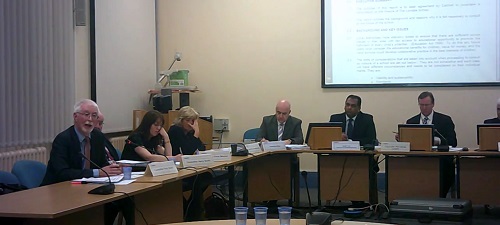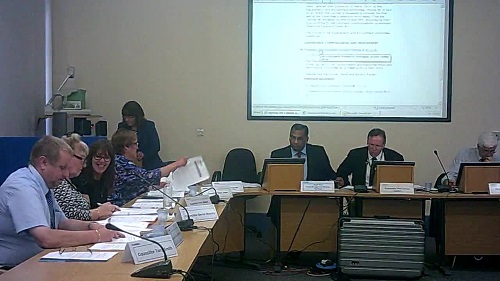
Councillor Tony Smith (Cabinet Member for Childrens Services) talks at the meeting of Wirral Council’s Cabinet which decided to consult on closing Lyndale School (16th January 2014)
If Lyndale School closed: what might happen next?
Usually I write about other people. However today because personal experience and stories shape who you are I felt the need to share some of my history as a child to make a number of points about the Lyndale School Closure consultation.
From ages four to ten, I went to a primary school in Upton that I really liked and enjoyed called St. Josephs Upton. At age ten, I was transferred to St. Josephs Birkenhead in the September of 1991. Both were great schools and this is in no way meant at all as any criticism of how either school was run.
I found myself taken away from the people I’d known and grown up with in Upton and put in an unfamiliar school I didn’t know my way round. To make things worse I no longer had my best friend to talk to and with it being the last year of primary school, the other kids had known each other for the last six years. I was the outsider.
Trying to make the best of a difficult situation I tried to fit in, but I found coping with the change very stressful, in fact extremely stressful would be a better way of describing it. To give one illustration, I remember collapsing and blacking out waiting in a dinner queue that week. The other kids and teachers did their level best to be welcoming, I can’t fault them on that but I just had a very hard time coping. It all took its toll on my health and after a week I ended up being admitted to Arrowe Park Hospital for days because the impact it had on my asthma.
In Arrowe Park Hospital, hospital school was only in the morning. I remember being puzzled that the school there finished at lunchtime and being told to go back to the ward! The staffing ratio (very different to the mainstream schools I was used to) was such that things were tailored on a very personal level and what the children could cope with because of their poor health. The small numbers of children there helped dispel the feelings I’d had of being lost (both in the feeling sense and literally as I didn’t know my way round) in a large school. In fact the small size of the hospital school (something that’s been given as a reason for closing Lyndale School down) was a positive for many reasons.
Five months later (still unhappy) I was transferred back to my previous primary school.
So why do I bring this up? Taking a young child out of a school and away from a school they’re used to, away from their friends, teachers they know and places they’re familiar with is something that very difficult to fully understand unless it has happened to you.
One of the points brought up by an officer during the consultation was that children have to change schools when they go to secondary school! This is not a fair comparison. The move to secondary school is very different as such a change is known and planned for years in advance. The change to secondary school everyone experiences together at the same time.
My health as a child is nowhere near the level of ill-health experienced by the children at Lyndale School. I’m sure (from an educational perspective) they have a somewhat comparable experience to that that I had at the hospital school, with a very tailored educational experience catering for their individual needs. Yet if one of them was put through what I describe above, whatever well-meaning “measures” are put in place by the “professionals” it would have far more damaging long-term effects than it did on me.
It wouldn’t be the same as what happened to me, it would be an experience far, far worse than a bad time from my childhood I still remember twenty-four years later. Julia Hassall has stated many times that the welfare of the children is important. Based on my personal experience (as outlined above), it was not in my interests for my primary school to be changed at age ten. The reasons given by the person who made the decision were to do with other people’s interests, not my interests and I had been against the change (but when does the world ever listen to a ten-year old?)
This is what will happen though if Lyndale School is closed and the children are transferred elsewhere. The children (the ones affected by this) won’t understand why it’s happening. There won’t be the option to go back as the Lyndale School will have been been closed. It will cause tremendous stress and upheaval that whatever the professionals may say about it being managed and measures being put in place to help with the transition, will have an effect on the children’s health.
Coping with the change will make the ones who have seizures more likely to have seizures. Those with breathing difficulties will have their condition made worse by the stress and as I did will black out (with all the problems that can cause). A certain proportion will react as I did and have such a rapid deterioration in their health that they end up in hospital. It may even shorten the life of some. These are extremely serious considerations.
Perhaps it is difficult for politicians that don’t have a professional background in education or health to fully understand these arguments. I’m sure there are some sceptics that feel that these effect are exaggerated by people keen to prevent the school being closed. They’re not!
History is littered with warnings and those who don’t heed its warnings are doomed to repeat its mistakes. I’m still around decades later, despite what happened to me to try and warn of what might happen.
In Charles Dickens’ A Christmas Carol there is a ghost of Christmas Past, Christmas Present and Christmas Future. In this analogy Wirral Council is seen as Ebenezer Scrooge. The warnings of Christmas Past, Christmas Present and Christmas Yet to Come have been given loud and clear to any councillors listening. It is getting to the stage where Scrooge has to change his ways. In the book Scrooge became a kinder, generous and more compassionate person, will Wirral Council follow the same path on Lyndale School or end up making an unpopular wrong choice for the wrong reasons that could have very serious consequences?
Wirral Council has a legal duty to ensure that all its decisions are compatible with people’s human rights. I brought up the right to education at the last consultation meeting but what about the effect of closing the school on people’s right to life?
If you click on any of the buttons below, you’ll be doing me a favour by sharing this article with other people.

